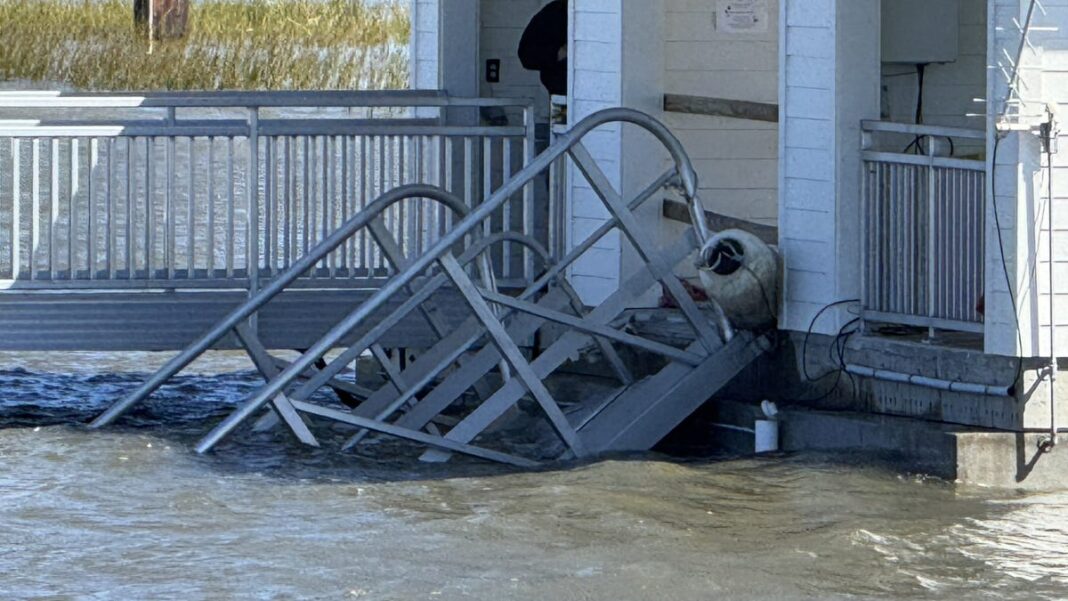‘A perfect day’ turns tragic: Investigation underway after 7 perish in Georgia dock collapse
SAVANNAH, Ga. − Engineers and experts began their assessments on Monday to uncover the reasons behind the “catastrophic failure” of a gangway that collapsed into the water at a ferry dock, leading to the deaths of seven individuals during Sapelo Island’s annual Cultural Day celebration.
The tragic incident occurred late Saturday as festival-goers were departing. Walter Rabon, the commissioner of the Georgia Department of Natural Resources, which oversees the ferries and dock operations, reported that around 20 people fell into the water, with estimates suggesting up to 40 people could have been on the gangway when it collapsed.
Rabon highlighted the crucial role played by bystanders, stating that their prompt actions helped save further lives. In the following hours, search-and-rescue teams from the Coast Guard utilized helicopters and boats equipped with sonar to locate individuals in the water.
Approximately 700 visitors used the ferry service that day, which was significantly higher than the usual traffic. When asked if the heavy use of the gangway might have led to the collapse, Rabon mentioned it was “possible that extra stress” contributed to the event.
“Anything constructed by humans has its limitations,” Rabon stated during a press briefing on Sunday. “I don’t know exactly what the limit is for the gangway. However, I’ve been informed that it should have been able to support the load it was under.”
Sapelo Island, located around 60 miles south of Savannah, is accessible solely by boat. The state-operated ferry between Meridian and the island takes approximately 20 minutes. According to Rabon, the dock and gangway were built in 2021, and both the Critical Incident Reconstruction Team and the Georgia Bureau of Investigation are looking into why the gangway collapsed so catastrophically.
Festival attendee shocked by tragedy
Jamie Arkins from Savannah attended the Sapelo festival for the first time on Saturday. She felt the atmosphere was exceptional, noting that there were no phones being used, just people relishing the lovely day, the vibrant festival, and one another’s company.
“I set my chair down in the middle of the celebration and took in all the sights, sounds, and smells,” she recounted on Sunday. She departed for the mainland on a ferry around 3 p.m., just one hour before the disaster occurred.
Arkins observed that the water was flowing rapidly beneath the gangway, and many people still needed to leave the island during the final ferry trips. She found out about the tragedy after she was back in Savannah.
“It was a perfect day – experiencing a bucket list moment, connecting with this community at risk,” she expressed. “Then, to hear of this disaster was like pouring salt into a wound.”
Sapelo’s residents have ancestral ties to the slave trade
Rabon mentioned that none of the deceased were locals from the island. Sapelo Island is home to roughly 70 full-time residents in the Hog Hammock community, recognized as the last remaining documented community of Saltwater Geechee worldwide. This group is part of the Gullah Geechee, descendants of West Africans who were enslaved to cultivate rice and indigo.
The Gullah and Geechee have sustained their presence along coastal areas and barrier islands from North Carolina to Florida, yet they are facing threats despite the establishment of the Gullah Geechee Cultural Heritage Corridor by Congress.
Their ancestors have lived on this land for nearly 300 years, starting their journey as slaves on plantations. The land, which stretched from Charleston, South Carolina, to Jacksonville, Florida, was reclaimed by the Union Army during and after the Civil War. Plans by Union Gen. William Sherman and Savannah’s Black ministers aimed to allocate the land to freed individuals in 40-acre lots, based on Special Field Order No. 15.
However, President Andrew Johnson rescinded this order within a year, returning a significant amount of the land to former plantation owners.
Tourism and rising sea levels threaten these communities
As tourism and development surge along the Southeastern coastline, the Gullah Geechee face challenges from outsiders wanting to develop their ancestral lands, as well as the pressing threat of rising sea levels, which could inundate barrier islands and displace millions.

